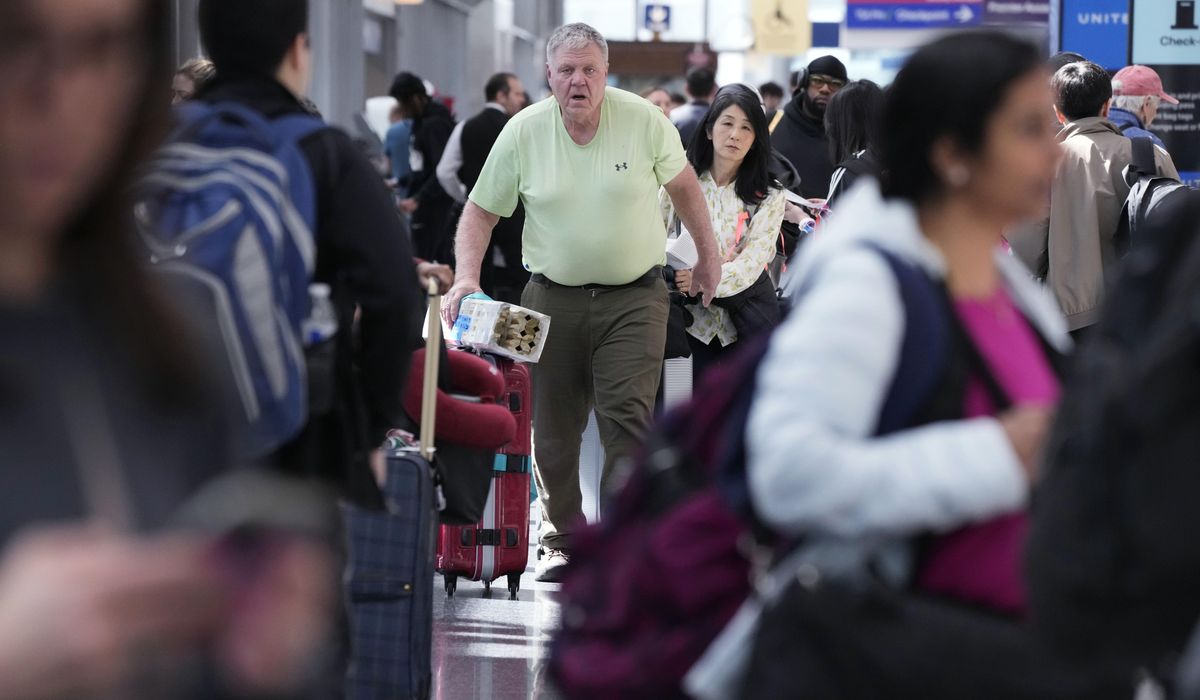

U.S. government’s multimillion-dollar poop-picking program is expanding, has international ambitions

Waste is a terrible thing to waste.
The U.S. government is expanding its program to collect your poop and believes picking through the nation’s feces is key to ensuring national security by helping officials spot and stop the next global pandemic.
The Traveler-based Genomic Surveillance program is expanding to more airports, seeking to detect more pathogens and getting much more taxpayer cash, while its director believes a supranational governing body is needed to coordinate poop collectors worldwide.
The Centers for Disease Control and Prevention’s surveillance program already gathers waste from international air travelers landing at John F. Kennedy International Airport in New York, Dulles International Airport near Washington, and airports in Boston and San Francisco.
Officials started the wastewater surveillance to hunt for outbreaks and new variants of COVID-19 and are expanding their purview to look for other viruses, such as influenza.
Dr. Cindy Friedman, founding director of the CDC’s program, said research from Northeastern University has shown that the U.S. government can buy three months’ worth of early detection capability — critical for infectious diseases such as COVID-19 — if 10 to 20 countries participate in the wastewater surveillance.
Dr. Friedman said at an April conference by Ginkgo Bioworks that she supported a major European effort to create a global wastewater consortium to oversee individual governments’ human waste surveillance programs.
“We definitely need global cooperation and supranational leadership because, really, it’s in all our best interests,” she said. “The early-detection piece, and whatever mitigation and public health actions come from that for whatever pathogen, really can help avoid the costly border closures, they can help avoid travel and trade disruptions, which is in everybody’s best interest.”
CDC spokesman Dave Daigle said the government has spent more than $60.3 million since 2021 on the program, which gathers samples directly from planes’ wastewater, wastewater sampling devices at airports, and nasal swabs of travelers.
Taxpayer spending on the program is doubling as the endeavor expands. Mr. Daigle said nearly $19 million was added in early 2024 to the program’s contract for its second-year allocation, up from approximately $17.7 million originally.
Ginkgo Bioworks, a Boston-based biotech company that has partnered with the U.S. government on the program, said in March the genomic surveillance efforts would soon operate at Chicago’s O’Hare International Airport and Miami International Airport, bringing the total number of participating airports to nine.
Only four airports are part of the government’s efforts to dig through dung so far, according to Mr. Daigle.
“The frequency of new outbreaks around the world reminds us every day that persistent and strategically focused biosurveillance is paramount to ensure readiness and rapid response,” said Matt McKnight, Ginkgo Bioworks general manager, in a statement in March.
The government’s effort to develop a global network of wastewater surveillance is a major undertaking that officials hope can enable the forecasting of pandemics in a manner similar to how meteorologists forecast hurricanes.
Northeastern University said last year it received $17.5 million from the CDC to take a lead role in the “Epistorm” project to help the U.S. predict the next outbreak.
Epistorm’s website said Northeastern, Ginkgo and eight other entities are participating in its project contracted with the CDC.
The project is part of $262.5 million that the CDC is spending over a five-year period on outbreak analytics and disease modeling, according to the Health and Human Services Department’s website documenting government grants and a CDC announcement.
The CDC, its partners and foreign governments believe more genomic surveillance is necessary worldwide. In March, the European Union announced plans to create an international system of wastewater surveillance at airports and other strategic locations to set up an early warning system for health threats.
The resulting GLOWACON, or Global Consortium for Wastewater and Environmental Surveillance for Public Health, is collaborating with the CDC, World Health Organization and the Bill and Melinda Gates Foundation, among others.
Growing international genomic surveillance may not sit well with privacy-conscious travelers, but China’s restroom-surveillance tech is perhaps more likely to disturb the huddled masses yearning to pee free.
In April, China-based filmmaker Christian Petersen-Clausen documented health-checking urinals popping up all over Shanghai in a series of posts on X.
Mr. Petersen-Clausen said he paid a small fee after using one of the urinals and soon received medical results to his phone that showed he lacked calcium. He acknowledged having privacy concerns with sharing his health data, but said on X that “the convenience is unbeatable.”
The U.S. government’s program is more discreet, and takes wastewater directly from planes and not from airport terminals.
The Biden administration intends for its collection protocols to avoid delays for passengers and to be less invasive than nasal swabs.
If the wastewater surveillance efforts prove ineffectual, the CDC appears willing to move on.
“There are some really good use cases for airplane wastewater surveillance, community wastewater surveillance, and all these innovations that have come out of the pandemic, but we should never be doing it just to do it because it’s a shiny new object,” Dr. Friedman said at the April conference. “We really need to know that it has public health value.”
• Ryan Lovelace can be reached at rlovelace@washingtontimes.com.
